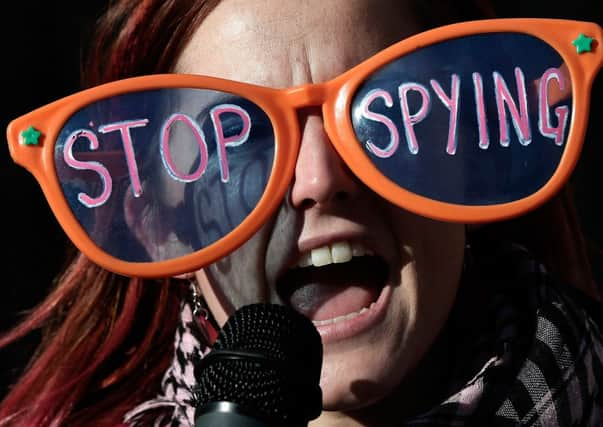Obama bans spying on allies in NSA reforms


The US president said the National Security Agency (NSA)would no longer tap the mobiles of people such as German chancellor Angela Merkel and Brazilian president Dilma Rousseff.
He said he wanted “concrete and substantial reforms” because he was concerned about the “potential for abuse” in intelligence gathering.
Advertisement
Hide AdAdvertisement
Hide AdLast night, he said: “The leaders of our close friends and allies deserve to know that if I want to know what they think about an issue, I’ll pick up the phone and call them, rather than turning to surveillance.”
The speech was an attempt to defuse the diplomatic and political storm over the NSA’s extensive global spying activities. Mr Obama was forced to act after Snowden, a former NSA contractor, leaked thousands of classified documents to the media and fled to Russia where he was granted temporary asylum.
Among the revelations was that the NSA had harvested private information from the computer systems of companies including Apple, Facebook, Google and Microsoft using a secret surveillance program called Prism. It also emerged that GCHQ, Britain’s electronic intelligence agency, was being paid millions of pounds a year to help target European Union officials.
Speaking at the US department of justice, Mr Obama said he wanted reforms to spying on allies and friends to “rebuild trust” in America. In future such monitoring would only be considered if there were “specific security requirements” such as cyber security and terrorism.
Mr Obama defended the NSA and said that “the intelligence community follows the law and is staffed by patriots”.
But he acknowledged that its activities could be perceived as “disquieting” and vowed to end the controversial mass collection of phone data in the US “as it currently exists”.
Rather than the NSA holding vast banks of metadata – phone numbers and the length of the call culled from individual phones – it will be held by a third party instead, although the details of this system will be worked out later. In the meantime, the NSA will need a judicial order to search the phone records, – the first time such a check has been introduced.
Mr Obama said that a panel of advocates representing the public will be present at the secretive courts the NSA uses to get authorisation.
Advertisement
Hide AdAdvertisement
Hide AdHe lashed out at Snowden and said that if others followed in his footsteps by making “sensational” leaks then America would “never be able to keep our people safe”.
Mr Obama said: “The bottom line is that people around the world – regardless of their nationality – should know that the United States is not spying on ordinary people who don’t threaten our national security, and that we take their privacy concerns into account.”
Mr Obama gave his speech after a six-month review process by a hand-picked panel which produced a 300-page report that he has broadly accepted.
Wikileaks founder Julian Assange said that Mr Obama was “dragged kicking and screaming” to make his announcement.
He said: “We heard a lot of lies in this speech… the real concern is that when you have an organisation as powerful as the NSA, that is a threat to constitutional government in the United States and other countries.”